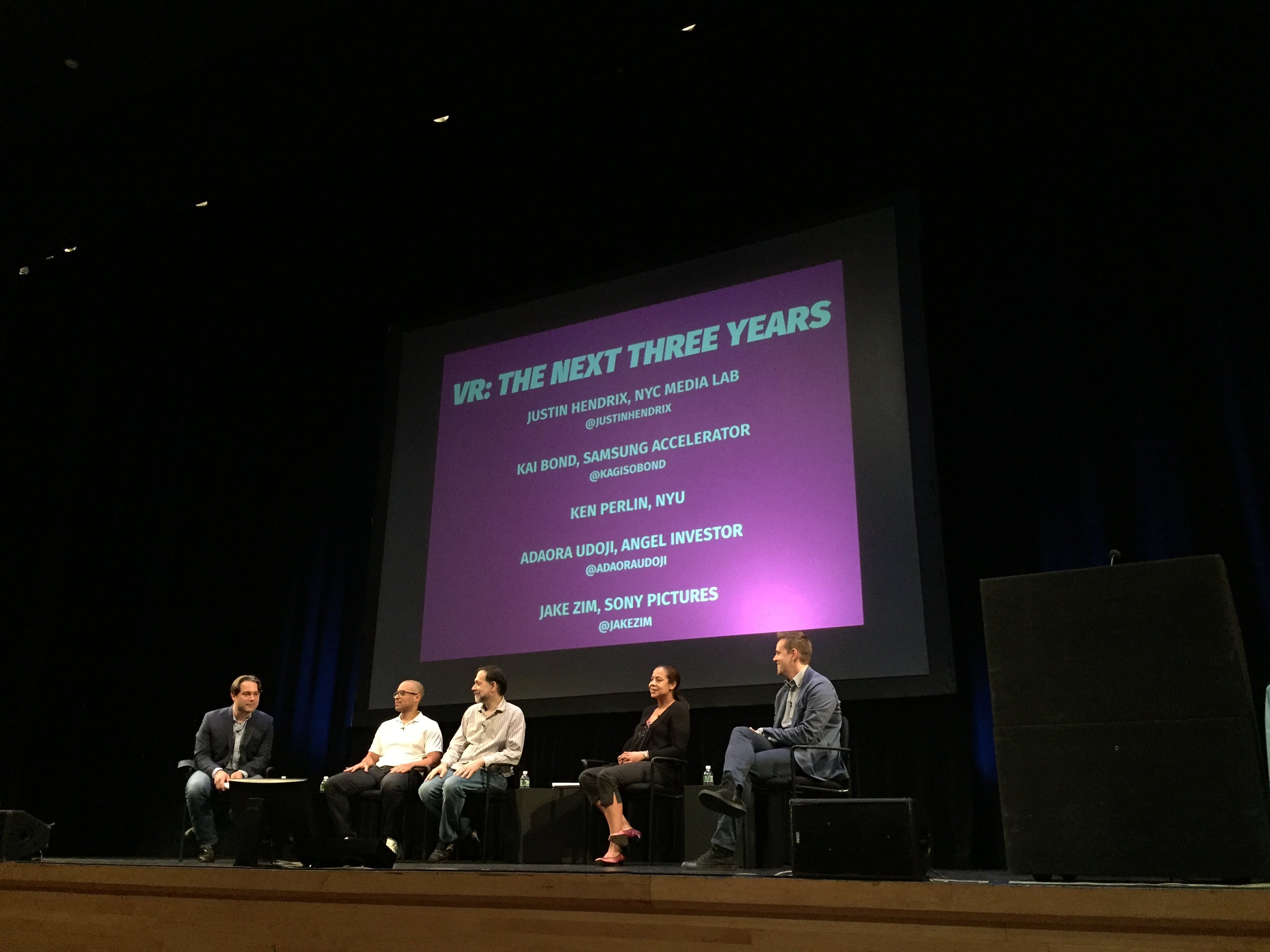In the future, virtual reality experiences won’t need to be so “high-end” – and they will have applications far beyond entertainment.
“This is a fundamental medium,” NYU Professor of Computer Science Ken Perlin said as part of a panel at the NYC Media Lab Summit. “This is like book printing. This is like the web. It’s not about a particular use, it’s about all uses.”
During the “Virtual Reality: The Next Three Years” panel discussion at last week’s summit, speakers were asked to share their predictions for the immediate future of virtual and augmented reality.
Panelist Jake Zim, the senior vice president of virtual reality for Sony Pictures Entertainment, oversaw the development of the Ghostbusters virtual reality game currently open at Madame Tussaud’s wax museum in New York City, a VR highly praised experience. He said within the next few years, there will likely still be opinion pieces about how virtual reality isn’t taking off, but “it’s all noise.”
There is a commercial place for VR, he said.
Perlin lauded the success of experiences such as Ghostbusters and the Pokemon Go augmented reality game, but also said high-end experiences are “the only thing you can do in 2016.”
“It’s like where the web was in 1995 and you had to go to an internet cafe,” he said. “Eventually there were no internet cafes because you had it at home and then you had it on your phone.”
From real estate to medicine, VR will likely be found in every industry, NYU adjunct professor and angel investor Adaora Udoji said.
“Any sector or category that you can imagine, there is somebody who’s taking a look at how this new technology may make a machine more efficient, may provide something new or different, some component that that industry hasn’t had access to before,” she said.
Kai Bond, the general manager for Samsung Accelerator NY, noted that there are already “real practical VR solutions impacting individuals’ lives” in the fields of autism and post-traumatic stress disorder.
For example, psychologists are using VR experiences as a form of simulated exposure therapy to help military veterans heal from PTSD. And the National Autistic Society developed a VR experience that allows the user to feel what it’s like to be an autistic person who is overwhelmed by too much stimuli in the surrounding environment.
VR Applications for the News Industry

The Nordic Aurora photographed with a Ricoh Theta, by Ken Usami. Used with permission from Ricoh.
Panelists touched on the applications of virtual reality in the news industry, as well. Udoji, a former broadcaster, said she wished she’d been able to use a Ricoh Theta when she covered the devastation left by Hurricane Katrina. The Theta is a small, handheld camera that allows the user to photograph an entire 360-degree space with one press of the shutter button.
Udoji also hailed the work that the Associated Press has done with virtual reality. In a little more than a year the news agency has produced 20 virtual reality and 360 videos, all of which live on a dedicated webpage. Topics are varied: they include an explainer about Alzheimer’s Disease, the New York Philharmonic’s summer performances, the premiere of Star Wars and a migrant camp in northern France.
“It’s one thing to hear a reporter talk to at you or to read something online or the paper,” Udoji said. “But it’s another thing to experience it in three dimensions.”
When asked what drives interest in virtual and augmented reality as a medium, Perlin’s answer was direct: the desire to communicate with others.
“If you want to see Death of a Salesman, you go to the theater,” he said. “If you want to see Son of Saul, go to the movie theater. Jane Austen works so incredibly well on a page. Any particular medium is better than the others in a particular way if it’s properly authored.”
VR And AR Featured During the Demo Showcase

Hundreds of students displayed their work during the NYC Media Lab’s Demo Showcase. Photo by Bianca Fortis.
During the Research & Prototyping Showcase, some of Viacom NEXT’s VR Fellows presented their projects. Six fellows from four NYC universities were chosen to work on their individual storytelling projects for eight weeks over the summer; they were provided access to VR equipment and professional mentors.
- Michelle Senteio’s “Curtain Call” requires users to uncover the mystery surrounding their own death.
- In Rosalind Paradis’ Park Walk, participants take the form of a baby and are encouraged to “embrace a spirit of childhood rebelliousness and mischief.”
- Tomonari Michigami’s The Lost Museum is about a man whose soul is trapped within a mask located inside of a museum; the user wears the masks and interacts with his past.
From a live Shakespearean production staged in virtual reality to an interactive program that allows the user to be a DJ, there were almost two dozen virtual and augmented reality projects featured in the Demo Expo, where hundreds of students had the opportunity to showcase their work.
Bianca Fortis is an independent journalist and social media consultant based in New York City. Her work has been published in newspapers throughout the country. She was a recipient of the 2011 Scripps Howard Foundation’s Semester in Washington Fellowship and won the 2013 I.F. Stone Award for Emerging Journalists through the Nation Institute. She is a founding member of the Transborder Media storytelling collective. Follow her on Twitter @biancafortis.

